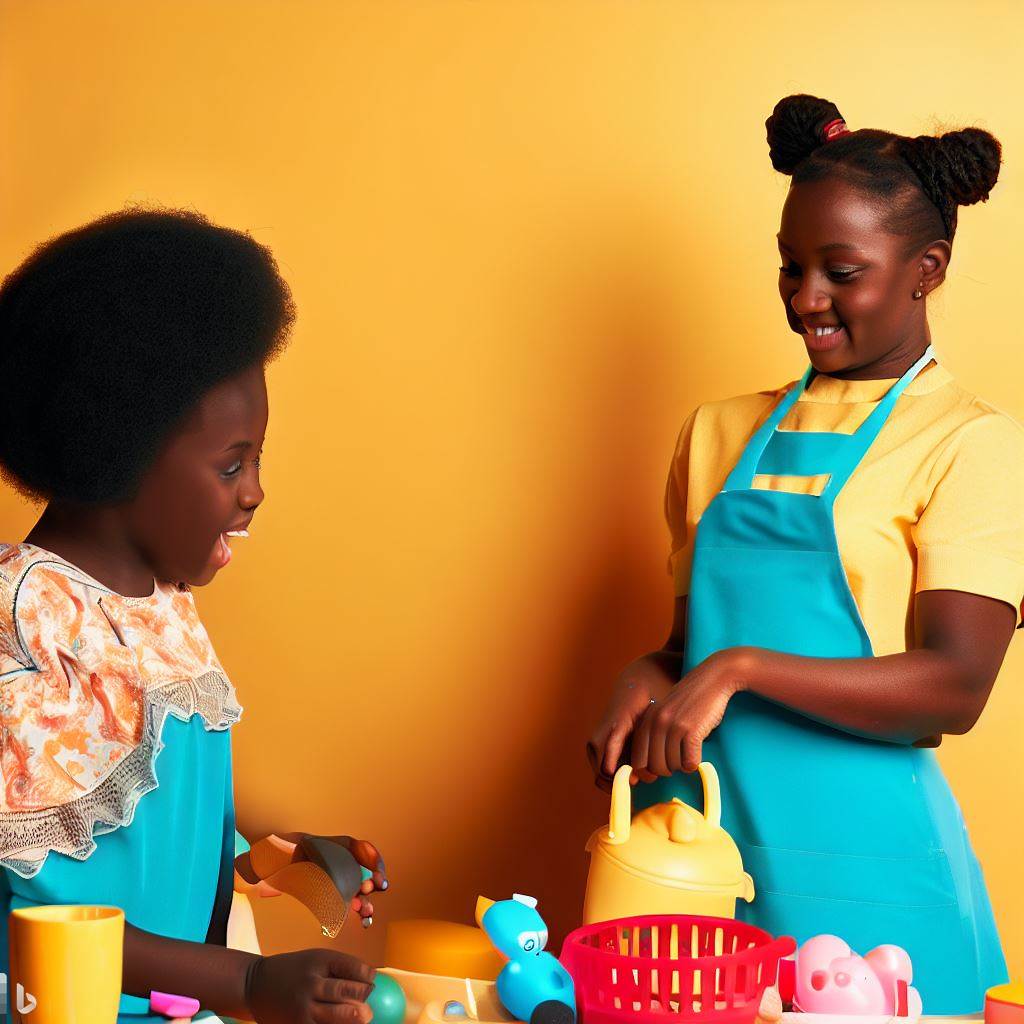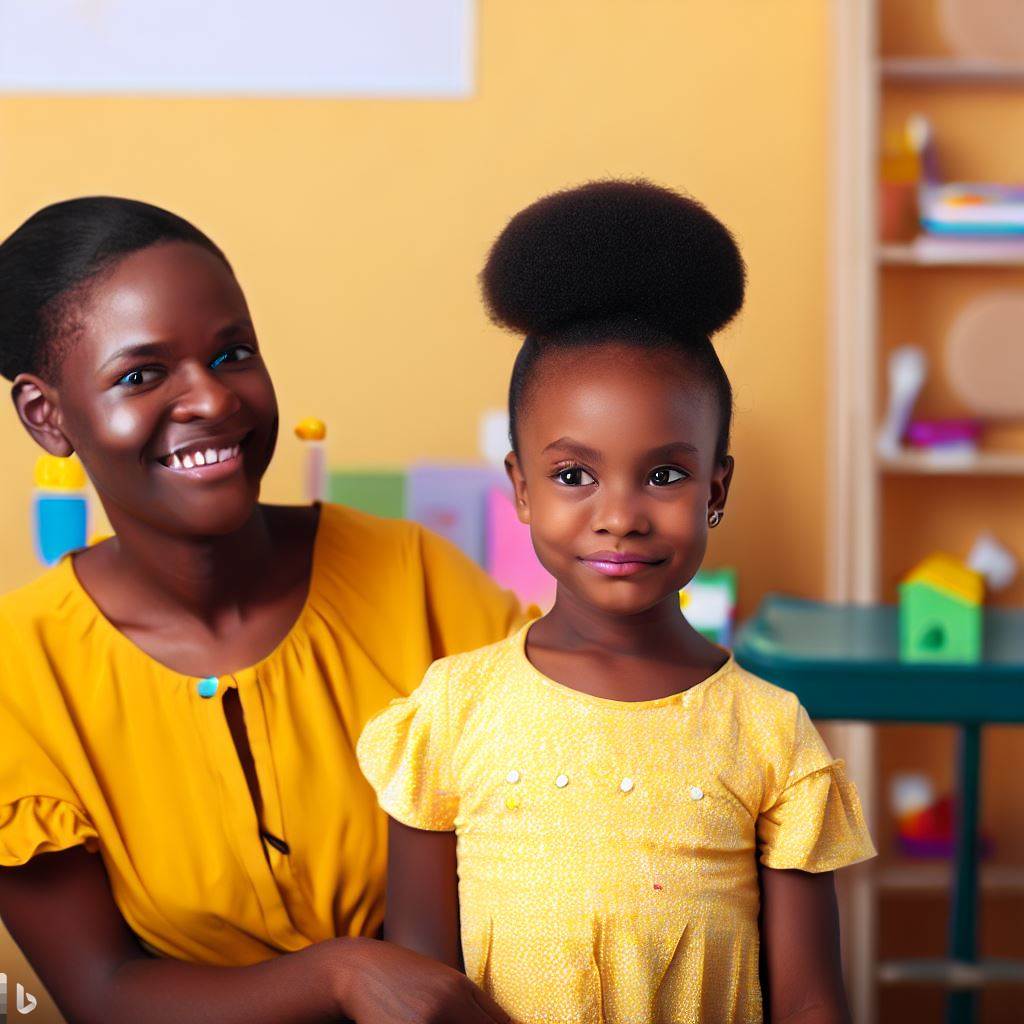Introduction
Child care provider duties in Nigeria is a crucial role, ensuring the well-being and development of children. They are responsible for the care, safety, and education of young ones.
Child care providers create a nurturing environment where children can thrive. They engage in activities that promote cognitive, social, and emotional development.
They monitor and address the individual needs of each child, providing proper nutrition, hygiene, and medical attention.
Child care providers also collaborate with parents, keeping them informed about their child’s progress. They facilitate learning through play, offering age-appropriate educational activities.
Additionally, child care providers implement discipline strategies that are fair and respectful. They maintain a safe environment, always prioritizing the child’s safety and well-being.
Child care providers also serve as positive role models, teaching values such as empathy, respect, and responsibility.
They build strong relationships with the children, fostering trust and a sense of security.
Overall, child care providers in Nigeria are vital in providing a nurturing and stimulating environment for children’s growth and development.
Qualifications and Training Required for Child Care Providers
When it comes to providing quality child care services in Nigeria, having the right qualifications and training is essential.
Child care providers play a crucial role in the development and well-being of children, so it is important that they have the necessary educational background and certification to excel in their field.
A. Educational and Certification Requirements
Child care providers in Nigeria are required to have a minimum educational qualification of a secondary school certificate.
This ensures that they have a basic level of knowledge and understanding necessary to care for children effectively.
Additionally, child care providers are encouraged to pursue further studies in relevant fields such as early childhood education or child development.
These additional qualifications can greatly enhance their ability to provide proper care and education to children under their supervision.
Furthermore, obtaining certification from recognized bodies or institutions is highly recommended.
Organizations such as the National Association for the Education of Young Children (NAEYC) provide certification programs that validate a child care provider’s expertise and professionalism.
By obtaining certifications, child care providers demonstrate their commitment to continuous improvement and meeting industry standards.
B. Importance of Ongoing Training and Professional Development
Child care is a dynamic field that constantly evolves along with new research, theories, and best practices. Therefore, it is crucial for child care providers to engage in ongoing training and professional development.
Ongoing training allows child care providers to stay updated with the latest information and techniques in child care.
It helps them understand and implement the best approaches to promote the physical, cognitive, and emotional development of children in their care.
Professional development opportunities, such as workshops, seminars, and conferences, provide child care providers with a platform to network and learn from experts in the field.
They can gain valuable insights and exchange ideas with their peers, resulting in improved practices and enhanced quality of care.
Moreover, ongoing training and professional development contribute to a child care provider’s career advancement.
It opens doors to higher positions, increased responsibilities, and higher levels of recognition in the industry. Qualifications and training are vital for child care providers in Nigeria.
Educational requirements, certifications, and ongoing professional development not only ensure that child care providers possess the necessary knowledge and skills, but also enable them to provide higher quality care to the children under their supervision.
By investing in their own education and professional growth, child care providers are investing in the future of Nigerian children, contributing to their overall development and well-being.
Read: Interviews with Successful Child Care Providers in Nigeria
Daily Care and Supervision of Children
When it comes to being a child care provider in Nigeria, there are numerous responsibilities that revolve around the daily care and supervision of children.
This includes tasks related to feeding, bathing, and dressing children, ensuring a safe and clean environment for them, as well as monitoring and engaging in age-appropriate activities.
Responsibilities Related to Feeding, Bathing, and Dressing Children
- Feeding: As a child care provider, one of your primary duties is to ensure that children are well-fed.
This involves preparing nutritious meals and snacks in line with their dietary requirements and preferences. - Bathing: Another important aspect of daily care is bathing children. This includes helping them with washing their bodies, hair, and teeth, as well as ensuring their overall hygiene.
- Dressing: You are responsible for dressing children appropriately, ensuring they are comfortable and dressed according to the weather conditions and any activities planned for the day.
Ensuring a Safe and Clean Environment for Children
Child care providers have a crucial role in creating an environment that is safe and clean for children.
This means regularly sanitizing toys, surfaces, and equipment, as well as ensuring that any potential hazards are minimized or eliminated.
Additionally, childproofing the living area and implementing safety measures are essential to prevent accidents and injuries.
Monitoring and Engaging in Age-Appropriate Activities
To promote the overall development of children, child care providers must monitor and engage them in age-appropriate activities.
This includes planning and organizing games, crafts, and educational activities that stimulate their physical, cognitive, and social skills.
It is crucial to create a balance between structured and unstructured playtime to cater to individual needs and interests.
In summary, child care providers in Nigeria have significant duties when it comes to the daily care and supervision of children. This includes responsibilities related to feeding, bathing, and dressing them.
It also involves creating a safe and clean environment and monitoring and engaging in age-appropriate activities that promote their overall development.
By fulfilling these responsibilities, child care providers play a vital role in ensuring the well-being and growth of the children under their care.
Read: Balancing Passion and Pay in Nigeria’s Education Jobs.
Health and Hygiene Duties
In addition to providing a nurturing and safe environment for children, child care providers also play a crucial role in maintaining their health and promoting good hygiene practices.
By implementing basic hygiene practices and recognizing and responding to illnesses, they ensure the overall well-being of the children under their care.
Maintaining Children’s Health by Ensuring a Clean Environment
- Regularly cleaning and sanitizing play areas, toys, and other surfaces to prevent the spread of germs.
- Creating a hygienic environment by following proper waste disposal practices and maintaining cleanliness.
- Encouraging children to practice cleanliness by keeping their belongings organized and teaching them to clean up after themselves.
- Providing a well-ventilated and clutter-free space to prevent the accumulation of allergens and irritants.
- Promoting outdoor activities and ensuring children have access to fresh air and sunlight.
Implementing Basic Hygiene Practices
- Teaching children the importance of handwashing and guiding them on how to do it effectively.
- Ensuring children wash their hands thoroughly before and after meals, after using the toilet, and after playing outdoors.
- Supervising toothbrushing routines and encouraging children to develop good oral hygiene habits.
- Teaching children how to cover their mouths and noses when coughing or sneezing to prevent the spread of germs.
- Providing tissues, hand sanitizers, and other necessary hygiene supplies for children to use.
Recognizing and Responding to Illness in Children
- Monitoring children’s health on a regular basis and promptly identifying any signs of illness.
- Checking for symptoms such as fever, cough, runny nose, rashes, and changes in behavior or appetite.
- Isolating sick children from the rest to prevent the spread of infectious diseases.
- Contacting parents or guardians when a child is unwell or requires medical attention.
- Following appropriate procedures for administering medication, as prescribed by parents or healthcare professionals.
In the end, child care providers in Nigeria have significant responsibilities in ensuring the health and well-being of the children they care for.
By maintaining a clean environment, implementing basic hygiene practices, and identifying and responding to illnesses, they play a vital role in promoting a safe and healthy environment for children to thrive.
Read: Career Growth Opportunities for Teachers in Nigeria
Educational and Developmental Support
Child care providers in Nigeria play a crucial role in providing educational and developmental support to children.
They create a stimulating and educational environment that helps children learn and grow. Child care providers assist children with their homework and educational activities.
They ensure that children complete their assignments and offer guidance when needed. Child care providers also encourage the development of various skills in children.
They promote social skills by organizing activities that encourage interaction and cooperation among children.
They facilitate cognitive development by engaging children in problem-solving activities and critical thinking exercises.
Physical development is also a priority for child care providers in Nigeria. They organize physical activities like games, sports, and exercises to promote a healthy lifestyle.
Child care providers also focus on the emotional and social development of children. They create a supportive and nurturing environment where children can express their feelings and emotions.
They teach children how to manage their emotions and resolve conflicts peacefully. Child care providers encourage independence and self-reliance in children.
They guide children in developing self-help skills like dressing, eating, and personal hygiene. Child care providers also play a crucial role in early literacy and numeracy development.
They introduce children to basic concepts of reading, writing, and numeracy through age-appropriate activities.
Child care providers engage children in storytelling, reading aloud, and basic math activities. They use play as a tool for learning, incorporating educational toys and games into the daily routine.
Child care providers promote the use of creativity and imagination in children. They provide opportunities for artistic expression through activities like drawing, painting, and crafts.
Child care providers also expose children to different cultures and diverse experiences. They celebrate festivals and engage in multicultural activities, promoting tolerance and acceptance.
Furthermore, child care providers monitor and evaluate each child’s progress and development. They maintain records and communicate with parents about their child’s growth and milestones.
Overall, educational and developmental support provided by child care providers in Nigeria is essential for children’s holistic development.
Read: Top Nigerian Universities to Kickstart Your Education Career

Communication with Parents/Guardians
Importance of maintaining open and effective communication with parents/guardians
Communication with parents or guardians is a crucial aspect of being a child care provider in Nigeria.
It is important to maintain open and effective communication to ensure the well-being and development of the children under your care.
Maintaining open lines of communication with parents or guardians can also facilitate collaboration and partnership in supporting a child’s overall development.
Through regular communication, child care providers can share insights and observations regarding a child’s behavior, skills, strengths, and areas for improvement.
This exchange of information promotes a holistic approach to the child’s growth, ensuring consistency between the home and child care environment.
Sharing daily updates on children’s activities, progress, and any concerns
One of the primary responsibilities of a child care provider is to keep parents or guardians informed about their child’s day-to-day activities, progress, and any concerns that may arise.
Sharing daily updates can provide parents with peace of mind and the assurance that their child is safe and well-cared for while they are away.
Furthermore, effective communication with parents or guardians allows child care providers to address any specific concerns or requests.
For example, a parent may share information about a recent change in the child’s routine or any sensitivities or allergies that the child may have.
By staying informed, child care providers can adapt their care strategies accordingly, ensuring the child’s safety and well-being.
Addressing any questions or concerns raised by parents/guardians in a professional manner
Effective communication also involves addressing any questions or concerns raised by parents or guardians in a professional manner.
As a child care provider, it is essential to listen attentively and respond promptly, demonstrating empathy and understanding.
By doing so, parents will feel respected and valued, which will contribute to a positive and trusting relationship.
Child care providers should embrace various communication methods to cater to the preferences of different parents or guardians.
This may involve using a combination of verbal communication, such as face-to-face meetings or phone calls, as well as written communication, including emails, newsletters, or digital platforms.
By offering multiple avenues for communication, child care providers can accommodate a diverse range of schedules and preferences.
In fact, the importance of maintaining open and effective communication with parents or guardians cannot be overstated in the role of a child care provider in Nigeria.
Sharing daily updates, addressing questions and concerns professionally, and promoting collaboration and partnership contribute to a positive and trusting relationship with parents or guardians.
Through effective communication, child care providers can ensure the well-being, safety, and holistic development of the children under their care.
Read: A Comprehensive Overview of Special Education in Nigeria
Emotional and Behavioral Support
In the realm of child care provision, it is essential to focus not only on physical development but also on emotional and behavioral growth.
Supporting children’s emotional needs and promoting healthy socialization
- Facilitating a safe and nurturing environment where children feel comfortable expressing their emotions.
- Encouraging positive relationships among children, promoting empathy and understanding.
- Teaching emotional intelligence, helping children identify and manage their feelings.
- Facilitating group activities that promote teamwork, cooperation, and conflict resolution skills.
- Creating opportunities for children to engage in pretend play, allowing them to explore emotions and roles.
Addressing behavioral challenges and implementing discipline strategies
- Developing clear and age-appropriate rules to establish behavioral expectations.
- Consistently enforcing boundaries while providing constructive feedback and guidance.
- Using positive reinforcement techniques, such as rewards and praise, to encourage desirable behaviors.
- Teaching children problem-solving skills to help them navigate conflicts independently.
- Implementing time-out or other appropriate consequences when necessary, always with explanation and support.
Recognizing and responding to signs of abuse or neglect
- Being vigilant and observant to identify any unusual or suspicious behavior exhibited by children.
- Establishing trusting relationships with children to create a safe space for them to disclose potential abuse.
- Regularly communicating with parents or guardians, discussing any concerns related to a child’s well-being.
- Reporting any suspected cases of abuse or neglect to the appropriate authorities or organizations.
- Collaborating with other professionals, such as social workers or psychologists, to ensure the child’s safety and well-being.
In short, emotional and behavioral support is a crucial aspect of child care providing in Nigeria.
By creating an environment that prioritizes emotional well-being, promotes healthy socialization, and addresses behavioral challenges appropriately, child care providers lay the foundation for children’s positive development and future success.
Read: Insights into the Teaching Profession in Nigeria Today
Emergency Preparedness and Safety
Ensuring children’s safety during emergencies or accidents
One of the primary responsibilities of a child care provider in Nigeria is to ensure the safety of the children under their supervision, especially during emergencies or accidents.
This requires a proactive approach to emergency preparedness and implementing safety protocols.
Firstly, child care providers must have a comprehensive plan in place to respond to various emergencies, including natural disasters, fires, and accidents.
They should be well-informed about the emergency procedures and train the children in their care to respond appropriately.
This includes teaching them how to evacuate safely in case of a fire or other emergency.
Implementing safety protocols, such as fire drills and childproofing measures
Regular fire drills are essential to familiarize both the child care providers and the children with the proper response during a fire emergency.
Providers should ensure that fire extinguishers, smoke detectors, and fire alarm systems are in good working condition and regularly tested.
They should also have a well-defined evacuation plan and designated meeting points outside the facility. In addition to fire safety, child care providers must also childproof the environment to prevent accidents.
This includes securing heavy furniture and electrical cords, installing safety gates, and covering electrical outlets.
Childproofing measures should be regularly inspected and updated as children grow and develop new abilities.
Responding promptly and appropriately to emergencies or accidents
Child care providers must be prepared to respond promptly and appropriately to emergencies or accidents that may occur despite prevention efforts.
They should have basic first aid knowledge and be trained in CPR. Regular refresher courses should be taken to keep skills updated.
In the event of an emergency or accident, it is crucial for child care providers to stay calm and take immediate action.
They should assess the situation, provide first aid if necessary, and contact emergency services as required.
Providers should also inform parents promptly and accurately about the incident and any actions taken.
Communication is key during emergencies, and child care providers must establish clear lines of communication with parents, emergency services, and relevant authorities.
They should maintain up-to-date contact information for all parties involved and have a communication plan in place to ensure a swift and effective response.
Overall, emergency preparedness and safety are essential aspects of the duties of a child care provider in Nigeria.
By implementing safety protocols, conducting fire drills, and responding effectively to emergencies, they can create a secure and protective environment for the children in their care.
Cultural Sensitivity and Inclusion
In an increasingly diverse world, cultural sensitivity and inclusion play a crucial role in nurturing a harmonious and respectful child care environment.
Child care providers have the responsibility to foster an inclusive setting that not only acknowledges but also celebrates cultural diversity.
Below are some key aspects of cultural sensitivity and inclusion in child care:
Fostering an inclusive environment that respects and celebrates cultural diversity
Child care providers have an essential role in creating an atmosphere that values and appreciates every child’s cultural background.
By embracing diversity, child care centers can teach children to respect and empathize with different cultures, enhancing their social and emotional development.
Creating an atmosphere where children feel accepted and valued for their unique cultural identities is crucial for their overall growth.
Promoting tolerance, respect, and understanding among children
Child care providers must actively promote tolerance, respect, and understanding among children from various cultural backgrounds.
They can organize activities such as storytelling sessions, where children learn about different cultures by listening to folktales from different parts of the world.
Encouraging children to share their traditions and customs helps in fostering an accepting environment where they appreciate and learn from one another.
Sensitivity towards cultural practices and beliefs of different families
Recognizing and understanding the cultural practices and beliefs of different families is vital to provide appropriate care to children.
Child care providers should make an effort to learn about different traditions, festivals, and dietary restrictions to ensure that the children’s needs are met in a culturally sensitive manner.
This can include accommodating dietary preferences or restrictions during meal planning and adapting daily routines to respect cultural practices.
By implementing these practices, child care providers can create a culturally inclusive environment that not only benefits children but also their families.
Benefits of cultural sensitivity and inclusion in child care:
- Promotes a sense of belonging and self-worth among children
- Encourages empathy, respect, and understanding
- Prepares children for a diverse society
- Increases cultural awareness and appreciation
- Strengthens relationships between child care providers and families
Ensuring cultural sensitivity and inclusion in child care is essential for creating a safe, nurturing, and respectful environment for children of diverse backgrounds.
By fostering an inclusive environment, child care providers not only promote tolerance and respect but also enhance children’s social and emotional development.
It is through cultural sensitivity and inclusion that children can learn to appreciate and celebrate the rich diversity that exists in our society.
Conclusion
Child care providers in Nigeria have significant duties and responsibilities. They play a crucial role in shaping children’s lives through nurturing, teaching, and caring for them.
It is important to emphasize the significance of their role in society and the impact they have on children’s development.
Supporting and appreciating child care providers is essential for the overall well-being and future of Nigeria.




